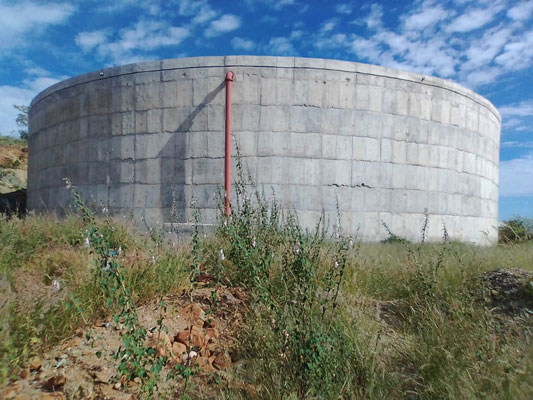
BY NQOBANI NDLOVU
Afive megalitre water reservoir in Gwanda town is viewed as a long-term solution to perennial water shortages in the Matabeleland South capital, but a year after its completion, the critical structure is lying iddle, leaving residents to endure punishing water woes.
Residents of suburbs such as Spitzkop North Extension, Phakama, Senondo and Ultra High have for years faced water shortages, and the construction of the reservoir was seen as the panacea.
Upon its completion in 2019, the only remaining work on the project involved the connection of pipes from the reservoir to the houses, but to date there has been no movement in that regard.
The project was started in 2011 to deal with water challenges in the town.
Gwanda municipality had at first projected that the project would be completed by November 2017, but failed to meet the deadline due to financial problems. It resumed after the government chipped in with $800 000.
Elias Sibanda, a resident of Phakama, said it was baffling to see the authorities dragging their feet to complete the piping to their homes to ensure a steady supply of the precious liquid.
“All we continue to hear are promises, being told that some technical testing has to be done,” Sibanda said.
- Chamisa under fire over US$120K donation
- Mavhunga puts DeMbare into Chibuku quarterfinals
- Pension funds bet on Cabora Bassa oilfields
- Councils defy govt fire tender directive
Keep Reading
Edna Moyo, a Senondo resident, said the municipality was not being upfront about what was delaying the laying of the pipes connecting them to the water reservoir.
“If it’s about the cost, at least we are prepared to shoulder the costs, I mean a certain figure can be levied per household so that the required funds are mobilised,” Moyo, a mother of five, said.
“Until then, residents here will continue to be forced to buy water from those who have sunk boreholes at their homes, but is not sustainable for some of us with big families.”
The town’s water shortages have been exacerbated by a rift between the Zimbabwe National Water Authority (Zinwa) and Gwanda municipality over the control of the resource.
Gwanda Town Council argues that Zinwa must hand over water and sewerage management to it in line with the Urban Councils Act, which vests the management of the services in local authorities.
The government allowed Zinwa to take over all water functions countrywide in 2006, a decision that was later reversed following protests from local authorities.
But Zinwa still controls the water supply and sewer infrastructure of some councils such as Gwanda.
In 2017, Gwanda Residents Association, Community Youth Development Trust (CYDT), Women Development Association in Zimbabwe (WDTZ), Positive Women Trust (PWT), Gwanda Community Economic Justice Development Trust (GCEJDT) and Restoration of Human Rights petitioned Parliament to take measures to force the Zinwa to hand over water and sewerage management to the council.
They argued Parliament must take action against Zinwa saying water is a human right, citing Section 77 of the constitution, which states that “Every person has the right to — safe, clean and potable water…and the state must take reasonable legislative and other measures, within the limits of the resources available to it, to achieve the progressive realisation of this right.”
Gwanda Residents Association secretary-general Bekezela Maduma Fuzwayo argued that as long as Zinwa refused to hand over control of water management to the council, the water woes would continue bedevilling the town even after the connection of suburbs to the five-megalitre reservoir.
“As residents of Gwanda, we have always demanded an urgent end to this dual administration of our water supply with a specific call for Zinwa to hand over the water purification plant to the Municipality of Gwanda,” said Fuzwayo.
“We have made numerous advocacy calls on the matter with both council and Zinwa and up to the level of the previous ministers of Water and Local Government.
“We have held communications and even demonstrations and all other possible avenues within our legal rights to call for the end of this arrangement, but it appears that we are not being heard.”
At one point, Zinwa threatened to install bulk water meters at the main reservoir to stop the municipality from accessing treated water without downpayments.
The bulk water meters were targeted at Gwanda municipality which obtains water from Zinwa for onward transmission to the town’s residents.
Gwanda mayor Jastone Mazhale blamed lack of progress on absence of government budgetary support “That is the only solution to the water challenges as it can store water for long periods of time and ensure residents get a steady supply of water even when there is no electricity,” Mazhale said.
“The laying of the pipes cannot take time if there is funding.
“It is a government-funded project; for now, we are doing the technical testing.
“With regard to the Zinwa issue, we are waiting for a ministerial response, but as council we have the capacity to run our water affairs.”
Local Government minister July Moyo was not answering his mobile phone when called for comment.











